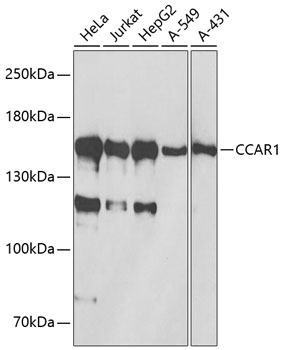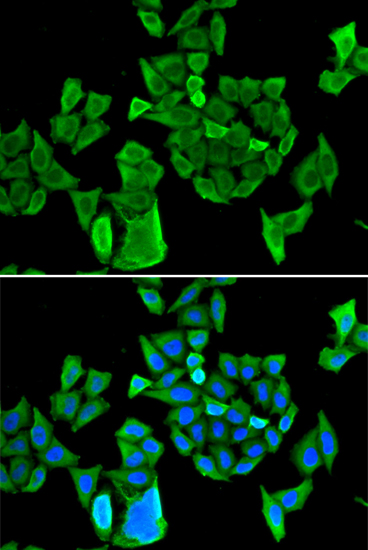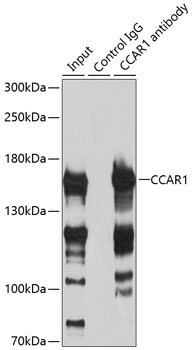-
Product Name
CCAR1 Polyclonal Antibody
- Documents
-
Description
Polyclonal antibody to CCAR1
-
Tested applications
WB, IF, IP
-
Species reactivity
Human
-
Alternative names
CCAR1 antibody; cell division cycle and apoptosis regulator 1 antibody
-
Isotype
Rabbit IgG
-
Preparation
Antigen: Recombinant fusion protein containing a sequence corresponding to amino acids 1-200 of human CCAR1 (NP_060707.2).
-
Clonality
Polyclonal
-
Formulation
PBS with 0.02% sodium azide, 50% glycerol, pH7.3.
-
Storage instructions
Store at -20℃. Avoid freeze / thaw cycles.
-
Applications
WB 1:500 - 1:2000
IF 1:50 - 1:200
IP 1:50 - 1:100 -
Validations

Western blot - CCAR1 Polyclonal Antibody
Western blot analysis of extracts of various cell lines, using CCAR1 antibody at 1:1000 dilution._Secondary antibody: HRP Goat Anti-Rabbit IgG (H+L) at 1:10000 dilution._Lysates/proteins: 25ug per lane._Blocking buffer: 3% nonfat dry milk in TBST._Detection: ECL Basic Kit ._Exposure time: 5s.

Immunofluorescence - CCAR1 Polyclonal Antibody
Immunofluorescence analysis of HeLa cells using CCAR1 antibody . Blue: DAPI for nuclear staining.

Immunoprecipitation - CCAR1 Polyclonal Antibody
Immunoprecipitation analysis of 200ug extracts of HeLa cells using 3ug CCAR1 antibody . Western blot was performed from the immunoprecipitate using CCAR1 antibody at a dilition of 1:500.
-
Background
Associates with components of the Mediator and p160 coactivator complexes that play a role as intermediaries transducing regulatory signals from upstream transcriptional activator proteins to basal transcription machinery at the core promoter. Recruited to endogenous nuclear receptor target genes in response to the appropriate hormone. Also functions as a p53 coactivator. May thus play an important role in transcriptional regulation (By similarity). May be involved in apoptosis signaling in the presence of the reinoid CD437. Apoptosis induction involves sequestration of 14-3-3 protein(s) and mediated altered expression of multiple cell cycle regulatory genes including MYC, CCNB1 and CDKN1A. Plays a role in cell cycle progression and/or cell proliferation. In association with CALCOCO1 enhances GATA1- and MED1-mediated transcriptional activation from the gamma-globin promoter during erythroid differentiation of K562 erythroleukemia cells. Can act as a both a coactivator and corepressor of AR-mediated transcription. Contributes to chromatin looping and AR transcription complex assembly by stabilizing AR-GATA2 association on chromatin and facilitating MED1 and RNA polymerase II recruitment to AR-binding sites. May play an important role in the growth and tumorigenesis of prostate cancer cells.
Related Products / Services
Please note: All products are "FOR RESEARCH USE ONLY AND ARE NOT INTENDED FOR DIAGNOSTIC OR THERAPEUTIC USE"
